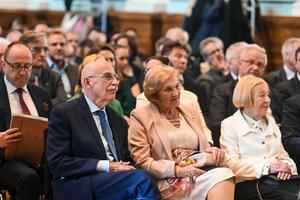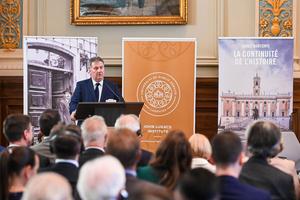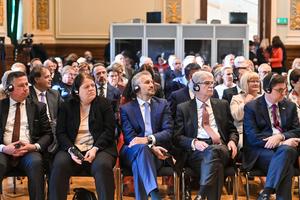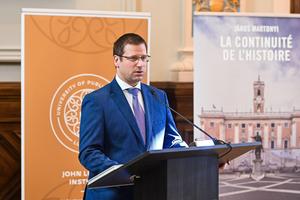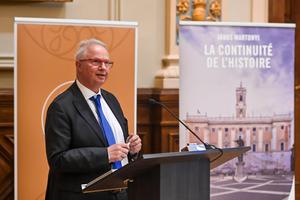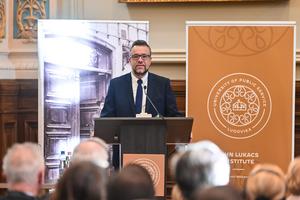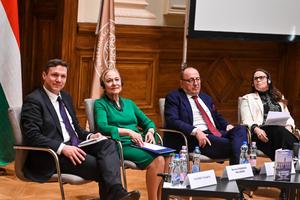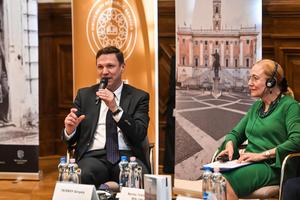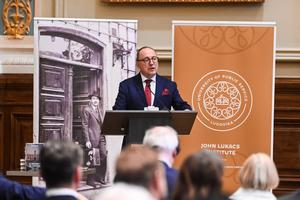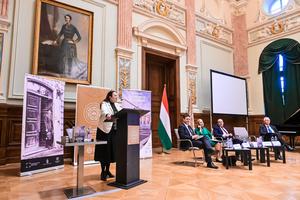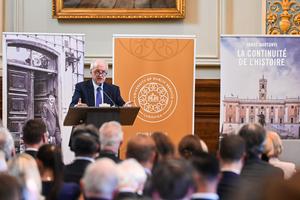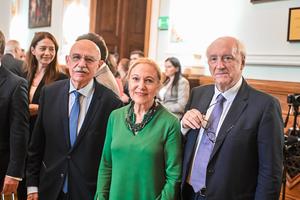A conference was held at the Ludovika University of Public Service (LUPS) on April 4th to celebrate the 80th birthday of János Martonyi, former Minister of Foreign Affairs of Hungary. Organised by the Eötvös József Research Center (EJKK) of LUPS and the John Lukacs Institute (JLI), in collaboration with the Habsburg Otto Foundation and the Hungarian Civil Cooperation Association, the event also featured the presentation of Martonyi's book titled "The Continuity of History" (La Continuité de L’Histoire), published in French by Ludovika University Press (LUP).
János Martonyi was 45 years old when Central Europe was liberated from Soviet oppression and 60 when Hungary became a member of the European Union. Until the age of 70, he represented the values important to our country under an external mandate," said Gergely Prőhle, program director of JLI, emphasising the essential nature of the celebrant's internal commitment to the country.
"The fact that the book has now been published in French is proof that by representing his own values, political, and historical perspectives, Martonyi is able to share his internal mandate with everyone," he declared. He stressed that the new book and Martonyi's previous studies help understand the framework of thinking in Central Europe. He added that the cover of the book, featuring the Roman Capitolium, symbolises, among other things, European integration and Christian Hungary.
The 80th birthday is always an occasion for retrospection, and János Martonyi's exceptionally rich life path also signifies an evaluation of our recent history," said Gergely Gulyás, Minister leading the Prime Minister's Office. The fact that the Hungarian civil right-wing could form a government was significantly influenced by János Martonyi, who not only served as a decisive figure as Minister of Foreign Affairs but also significantly impacted the shaping of domestic politics," stated the politician.
Martonyi János and Ferenc Mádl were the ones who, along with the Hungarian Civil Cooperation Association and the organisations established in 1994-95, advocated for the need for a credible civil solution alongside the post-communist alternative," he recalled. He also mentioned that Martonyi was not only a professor of international private law but also an excellent connoisseur of public law, which is important because, in his opinion, the lack of respect for the law is the biggest problem in Europe today, and Europe suffers most from this.
"One can only think as a European while also identifying with a nation," summarised János Martonyi, one of the minister's most important thoughts. "The knowledge, experience, and thoughts of János Martonyi will continue to be greatly needed, and the essence of his political career enriches all of us," concluded Gergely Gulyás.
János Martonyi speaks French excellently, which greatly helped communication," recalled Hubert Védrine, former French Minister of Foreign Affairs, who sees Martonyi, along with Milan Kundera, as the one who helped him most in understanding "Central European" thinking, which is an important part of national identity. He also praised the newly published book, which he believes deals with important European Union issues.
"This work clearly demonstrates that Martonyi's diplomatic work was deeply experienced and led by intellectually passionate consideration," emphasised Pál Hatos, director of the EJKK Central Europe Research Institute.
In the second part of the event, following the introduction by Gergely Fejérdy, Deputy Director of the Habsburg Otto Foundation, Benita Ferrero-Waldner, former Federal Minister for European and International Affairs of the Republic of Austria, addressed the issue of identity as one of the important concepts of the new book.
Németh Zsolt, Chairman of the Foreign Affairs Committee of the National Assembly, highlighted from Martonyi's tenure as Minister of Foreign Affairs, among other things, the first successful Hungarian presidency of the European Union in 2011. Trócsányi László, Rector of Károli Gáspár University of the Reformed Church, expressed that Martonyi is a true European personality. Claire Legras, the Ambassador of France to Budapest, referred to Martonyi János as an important representative of constitutional identity.
Following the presentations, Győri Enikő, Member of the European Parliament and President of the Hungarian Civil Cooperation Association, delivered a toast, recalling how Martonyi János always enjoyed being inspired by conversations with others, and for those who worked with him, his thoughts became the measure. She stated, "For Martonyi János, there is only one yardstick: the homeland."
At the end of the event, the celebrant reaffirmed that the most important principle is belonging to the national community, which is compatible with European thinking.
Text: Réka Zsuzsanna Szabó
Photo: Dénes Szilágyi
